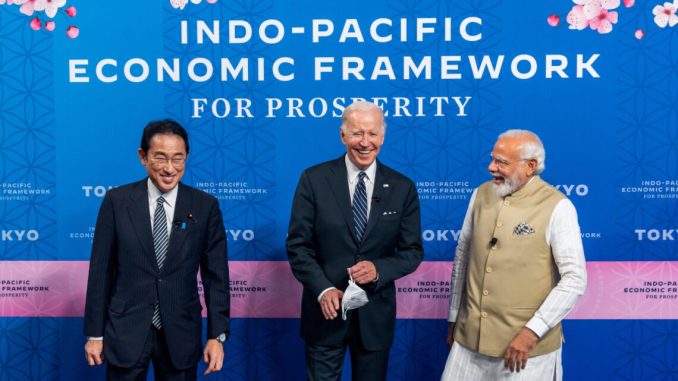
The Indo-Pacific Economic Framework for Prosperity (IPEF) was launched by President Joe Biden of the United States of America during a meeting in Tokyo, Japan last 23 May 2022. Aside from the US, 12 other countries were the initial partners, namely Australia, Brunei, India, Indonesia, Japan, the Republic of Korea, Malaysia, New Zealand, the Philippines, Singapore, Thailand, and Vietnam, with Fiji becoming the latest member, bringing the total to 13. The IPEF has Four Pillars of Cooperation: 1) Connected Economy (trade); 2) Resilient Economy (supply chains); 3) Clean Economy (energy, decarbonization, and infrastructure); and 4) Fair Economy (tax and anti-corruption).
From all the rhetoric coming from the White House, the IPEF serves as an antagonist to the recently enforced, China-led Regional Comprehensive Economic Partnership (RCEP) and tries to reclaim the lost grounds of US hegemony, vis-a-vis China’s interest in the Asia-Pacific region. The RCEP has 15 member countries with China at the helm. The US is notably absent from this free trade agreement (FTA). The Comprehensive and Progressive Agreement for Trans-Pacific Partnership (CPTPP), another FTA in the region composed of 11 countries, with the US again being absent, with China already signifying its intention last September 2021 to join the said FTA. Both RCEP and CPTPP, along with other bilateral trade agreement between China and other countries in the Asia-Pacific is a growing threat to the US interests in the region.
But IPEF is different from the FTAs mentioned above in the sense that it imposes no tariffs and market access as part of the negotiation agenda. Unlike other FTAs, the IPEF allows the countries to join and negotiate a single pillar without the rest becoming a requisite. It also waives the US from any commitments made by the other 13 countries. Furthermore, the IPEF being a non-FTA allows President Biden to conveniently bypass the US Congress, evading any obstacles his rivals inside the US Congress can come up with.
The flexibility provided by the IPEF promotes the corporate agenda of the US transnational corporations (TNCs) operating around the ambit of the Four Pillars. This includes those from Big Tech and logistics companies like Amazon and Tesla which make electric vehicles and their batteries production. Big Finance companies like JP Morgan and its subsidiaries, will play a major role in monitoring cross-border financial transactions under Pillar Four, furthering their grip on global finance.
Despite the chatter about safeguarding labor rights under the IPEF, these TNCs have proven how they exploit the workers in the US, as well as along their whole supply chains across the Asia-Pacific. Amazon workers in the US and all along their supply chains are notoriously underpaid, with horrible working conditions. Workers from lower tier logistics companies in the region are even paid less, with a greater pliancy in the interest of such companies, and with precarious employment conditions.
Tesla and other similar companies, including mining corporations, will pursue plunder of raw materials coming from developing countries that are rich in natural resources to fuel their production demand. Countries like India, Indonesia, the Philippines, and West Papua, among others, will be targets for greater plunder of their natural resources, leading to the displacement of rural peoples, including farmers and indigenous peoples, together with an increased threat to the environment and climate.
Alongside the promotion of the interests of the US TNCs, the IPEF is meant not only for trade but to further the geopolitical agenda of the US in Asia-Pacific. Quoting the US Secretary of Commerce, the IPEF is “presenting Indo-Pacific countries an alternative to China’s approach”. With the US and China still in a trade war, along with other brewing tensions across the region, the Indo-Pacific pivot of the US, which President Barack Obama started during his term and is now being pursued by President Biden, will intensify the geopolitical tension of the whole Asia-Pacific region.
With the pressing issues of rising prices of basic commodities like food and fuel, the declining real wages and purchasing power of workers, and the destruction of local agriculture through trade liberalization and dumping of agricultural products, the IPEF and its Four Pillars will degrade the lives of the people and the planet. What the world needs right now is to put the interest of the people over the profits of TNCs, decent jobs for workers, land for the tillers, and a peoples’ trade agenda without the profiteering TNCs.#

Leave a Reply